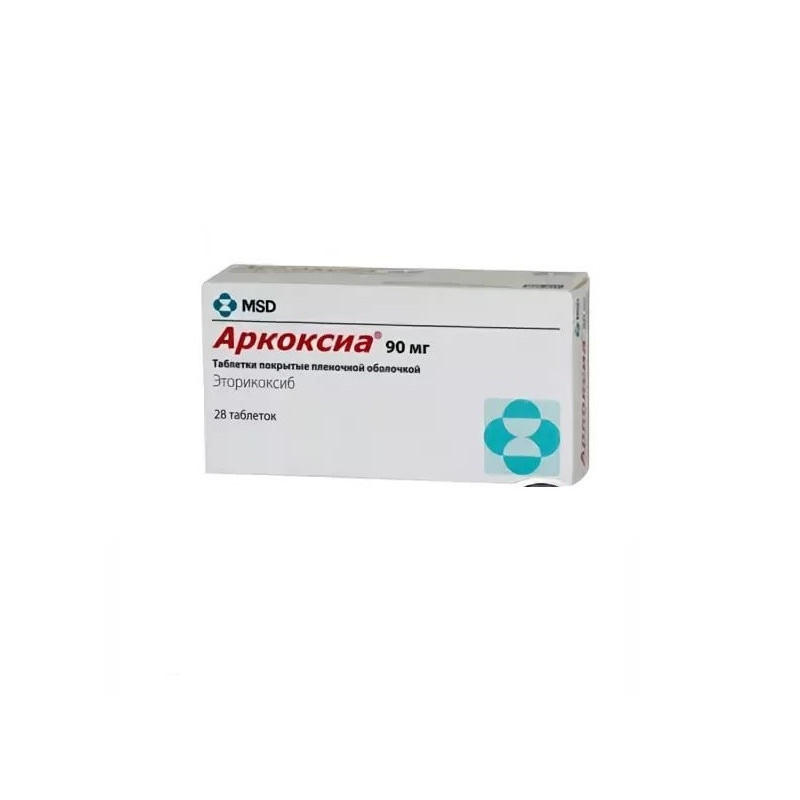



 All payments are encrypted via SSL
All payments are encrypted via SSL
 Full Refund if you haven't received your order
Full Refund if you haven't received your order
Symptomatic therapy of the following diseases and conditions:
Arcoxia pills are taken by mouth, regardless of the meal, with a small amount of water.
In osteoarthritis, the recommended dose is 60 mg 1 time per day.
In rheumatoid arthritis and ankylosing spondylitis, the recommended dose is 90 mg 1 time per day.
In acute gouty arthritis, the recommended dose in the acute period is 120 mg 1 time per day.
The duration of use of the drug in a dose of 120 mg is not more than 8 days. The minimum effective dose should be used with the shortest possible short course.
The average therapeutic dose for pain syndrome is 60 mg once.
Gastrointestinal: often - epigastric pain, nausea, diarrhea, dyspepsia, flatulence; sometimes - bloating, belching, increased peristalsis, constipation, dryness of the oral mucosa, gastritis, gastric or duodenal ulcers, irritable bowel syndrome, esophagitis, ulcers of the oral mucosa, vomiting; very rarely - gastrointestinal ulcers (with bleeding or perforation), hepatitis.
Nervous system: often - headache, dizziness, weakness; infrequently - a violation of taste, drowsiness, sleep disorders, sensitivity disorders, incl. paresthesia / hyperesthesia, anxiety, depression, concentration disorders; sometimes - hallucinations, confusion.
Special senses: sometimes - blurred vision, conjunctivitis, tinnitus, vertigo.
Urogenital: sometimes proteinuria; very rarely - renal failure, usually reversible with drug withdrawal.
Allergic reactions: very rarely - anaphylactic / anaphylactoid reactions, including a pronounced decrease in blood pressure and shock.
Cardiovascular: often - heartbeat, increased blood pressure; sometimes - hot flashes, cerebrovascular accident, atrial fibrillation, congestive heart failure, nonspecific ECG changes; myocardial infarction, very rarely - hypertensive crisis.
Respiratory: sometimes - cough, shortness of breath, nosebleeds; very rarely - bronchospasm.
Dermatologic: often ecchymosis; sometimes - swelling of the face, itching, rash; very rarely - urticaria, Stevens-Johnson syndrome, Lyell's syndrome.
Infections:sometimes - gastroenteritis, infections of the upper respiratory tract, urinary tract.
Musculoskeletal system: sometimes - muscle cramps, arthralgia, myalgia.
Endocrinological: often - swelling, fluid retention; sometimes - changes in appetite, weight gain.
From the laboratory research: often - increased activity of hepatic transaminases; sometimes - increased nitrogen in the blood and urine, increased activity of CPK, decreased hematocrit, decreased hemoglobin, hyperkalemia, leukopenia, thrombocytopenia, increased serum creatinine, increased uric acid; rarely, an increase in serum sodium.
Other: often - flu-like syndrome; sometimes - pain in the chest.
Carefully use the drug in the presence of anamnestic data on the development of ulcerative lesions of the gastrointestinal tract, Helicobacter pylori infection,in elderly people, in patients who have used NSAIDs for a long time, who often drink alcohol, in severe somatic diseases, dyslipidemia / hyperlipidemia, in diabetes mellitus, hypertension, edema and fluid retention, in patients with QA less than 60 ml / min, in concomitant therapy with the following drugs: anticoagulants (for example, warfarin), antiplatelet agents (for example, acetylsalicylic acid, clopidogrel), GCS (for example, prednisolone), selective reuptake inhibitors that serotonin (eg, citalopram, Fluoxetine, paroxetine, sertraline). In patients with hepatic insufficiency (5–9 points on the Child-Pugh scale), it is recommended not to exceed a daily dose of 60 mg.
Taking Arcoxia requires careful monitoring of blood pressure. All patients in the appointment of the drug should be monitoring blood pressure during the first two weeks of treatment and periodically thereafter.
You should also regularly monitor indicators of liver and kidney function.
In case of an increase in the level of hepatic transaminases by 3 times or more relative to VGN, the drug should be canceled.
Given the increased risk of adverse effects with increasing duration of administration, it is necessary to periodically assess the need to continue taking the drug and the possibility of reducing the dose.
Do not use the drug at the same time as other NSAIDs.
The shell of the drug Arcoxia contains lactose in small quantities, which should be considered when prescribing the drug to patients with lactase deficiency.
During the period of treatment, care must be taken when driving vehicles and engaging in other potentially hazardous activities that require increased concentration and psychomotor reactions. Patients with episodes of dizziness, drowsiness, or weakness should refrain from activities that require concentration.
Keep out of the reach of children at a temperature not exceeding 30 ° C.
- 2 years
Arcoxia